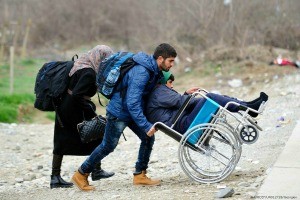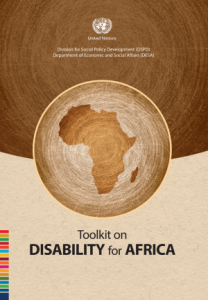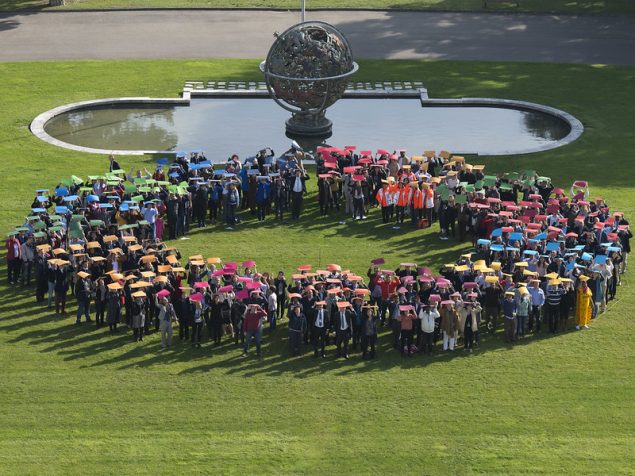Background
The global community is facing an increasing number of protracted humanitarian crises, which have a significant impact on persons with disabilities. Armed conflicts and emergency situations increase the number of disabling barriers on a larger scale, and also heighten the risks and vulnerabilities that persons with disabilities face as they seek out assistance, support and protection.
Persons with disabilities are among the most marginalised and excluded groups in emergency situations, experiencing widespread violations of their rights. In crises, persons with disabilities have the same basic needs common to all those affected, in addition to specific needs related to disability. However, they are often not counted in needs assessments and experience environmental, cultural and attitudinal barriers to accessing essential services in emergency and humanitarian responses.
The World Humanitarian Summit offers opportunities to strengthen the visibility of the rights and interests of persons with disabilities in humanitarian crises and to advance appropriate actions to close existing gaps and ensure humanitarian efforts are truly inclusive.
The United Nations Convention on the Rights of Persons with Disabilities provides an international human rights and development framework for persons with disabilities and contains specific provisions for humanitarian crises and emergencies. Since the adoption of the Convention, the global community has demonstrated increased attention and commitment to addressing the specific needs and interests of persons with disabilities in disaster and crisis situations.
Despite these advances, there remains a challenge to translate international commitments to action that is systematically inclusive of persons with disabilities at the operational level. Progress has been made among humanitarian actors to develop and apply inclusive tools and guidelines in humanitarian responses.
Nonetheless, experience has shown that a significant number of barriers persist in terms of involving persons with disabilities and their organisations in decision making processes and at all stages of humanitarian action.
WHS Charter on disability-inclusive humanitarian action
In response to existing challenges, a proposal for the development of a Charter on disability inclusive humanitarian action and global standards and guidelines are being developed for endorsement at the World Humanitarian Summit. The Charter will provide overarching principles representing a commitment to disability-inclusive humanitarian action. The system-wide standards will seek to support States’ obligations set under the Convention on the Rights of Persons with Disabilities, and would facilitate the implementation of other inclusive frameworks, such as the Sendai Framework for Disaster Risk Reduction and the 2030 Agenda for Sustainable Development, recognising and addressing the capacities, rights and diversity of persons with disabilities affected by crisis and conflict.
Objectives of the Forum
The DSPD/DESA Forum on Disability-Inclusive Humanitarian Action will take place on 22 May 2016, in the lead up to the World Humanitarian Summit (23-24 May 2016) as a technical contribution to the special event on disability during the Summit. It will provide a timely opportunity for decision-makers, experts, civil society and actors in humanitarian work to have an open and in-depth discussion on challenges and opportunities in advancing disability inclusive humanitarian action. The Forum will also facilitate sharing of experiences and good practices, including by reviewing and building on lessons learned from the Sendai process and experiences in DiDRR, as well as existing disability-inclusive efforts at local, national and international levels. The Forum will also offer an opportunity to discuss next steps in strengthening disability-inclusive humanitarian action, including the adoption of a Charter on disability inclusion, and to validate a road-map for the development of system-wide standards and guidelines.
Resources:
- Charter on Inclusion of Persons with Disabilities in Humanitarian Action
- “NO-ONE LEFT BEHIND” Protecting human rights in humanitarian crises. A side event of the WHS organized by OHCHR on Monday, 23 May, 8:30-10:00 a.m., Rumeli 7 room, at LKCC building, Istanbul, Turkey.
- Disability-inclusive Humanitarian Action
- World Humanitarian Summit, 23-24 May 2016, Istanbul Turkey
- Thematic study on the rights of persons with disabilities under article 11 of the Convention on the Rights of Persons with Disabilities, on situations of risk and humanitarian emergencies, Human Rights Council, Thirty-first session, 30 November 2015
- Statement on disability inclusion for the World Humanitarian Summit, Committee on the Rights of Persons with Disabilities
- UN Enable Page on Disability-Inclusive Disaster Risk Reduction and Emergency Situations





